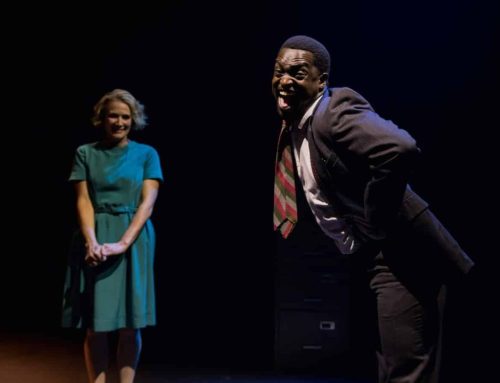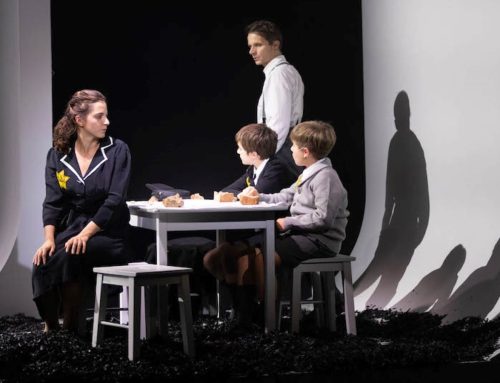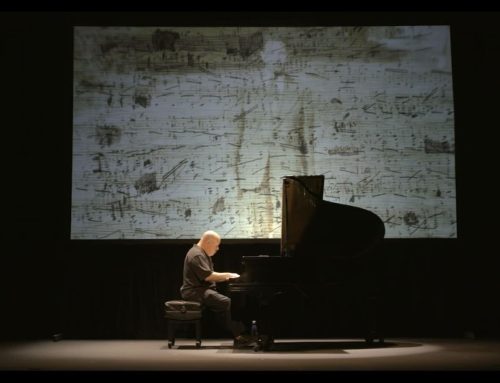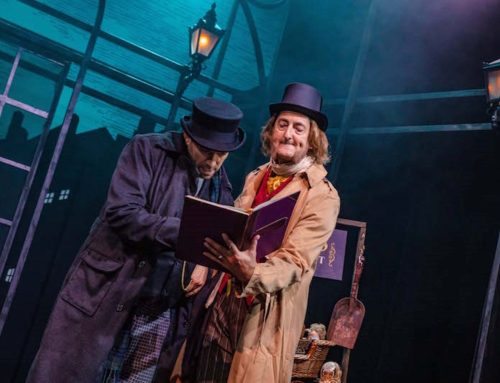Grieving, alcoholic, fifty-something Chrissy is a shivering, sweating mess who can just about shuffle from the sofa she sleeps on to her armchair. Her mortgage payments are overdue and there is nothing in the bank. The floor is strewn with empty beer cans and wine bottles. She has not drawn the grotty living-room curtains for a month. The grimy pile of vomit-smeared ironing at the foot of the stairs has probably been there just as long. Worse, she gets repeated visits from the ghost of dead daughter Heather, during which the events leading up to her mysterious demise are revisited, again and again. No wonder sister Claire, who likes a drink or two herself, thinks Chrissy should go into rehab. But the last time Claire tried to drive her sibling to the detox hospital, Chrissy ended up jumping out of a moving car. Will this time be any different? There are four cans of beer left and a decision to be made.
There are moments of sheer brilliance in The Dry House, most obviously in the intensely well-observed relationship between the two sisters. Their bickering descends into bitterness at the drop of a hat, yet the love between them is palpable. This is a relationship between siblings, each with their own weighty burden of secrets, that feels recognisable, real, and deeply affecting. Mairead McKinley is phenomenal as the wild haired, handwringing, grief-stricken Chrissy, with a “fist of tar for a heart”, whose determination to destroy herself with drink is almost messianic. “You died already, and this is what your death is like” she tells herself and you can see that pain in the lines carved deep into the puffy flesh of McKinley’s face. When the character talks of drinking the only alcohol left in the house – her dead daughter’s bottle of Ralph Lauren perfume – it is a moment of exquisite dramatic intensity.
Equally excellent is Kathy Kiera Clarke’s turn as the stressed and fidgety Claire who cannot help herself cleaning up the squalor that her sister inhabits; there is a hint that things have always been this way between the two. Claire is also a drinker, a habit both sisters seemingly picked up from their hard-boozing dad. However much she hates “the wiry lace of nastiness flowing through alcohol’s laughter” she, too, cannot pass an afternoon without a fix of merlot. She keeps it a secret from husband and kids. At least Chrissy’s bitter ache for destruction has a grain of self-awareness and honesty at its core.
All this might make for a bleak 90-minutes, but writer and director Eugene O’Hare injects a welcome stand of dark humour into events. There is light and shade here, and at its heart this is a story of hope, redemption, and the importance of honesty in facing grief.
Opinions will vary as the how much dramatic impact the ghostly presence of Heather (Carla Langley) adds. Repeated conversations with both mother and aunt are certainly a useful, if occasionally clunky tool for laying out exposition. But O’Hare also gifts her with an over-long, fourth-wall breaking monologue, delivered directly to the audience, that delivers a whole heap of unnecessary and distracting backstory. It is almost as if the writer has chopped a scene from a different play, with a quite different theme, and dropped it mid-way into the storyline. The audience ends up knowing things about Heather that neither mother nor aunt can even imagine, and which add nothing to understanding the central relationship between the two sisters. It is a baffling bit of writing that strips the piece of momentum at a vital moment.
Niall McKeever’s letter-box style set, thick with the muck and the detritus of a failed life, is excellent. It feels like the Marylebone Theatre design team are finally getting to grips with how to use the venue’s unusual stage space to best effect.
Writer and Director: Eugene O’Hare
More Recent Reviews
Playfight. Soho Theatre.
Writer Julia Grogan’s breathtakingly assured debut play arrives at Soho Theatre following stellar reviews at the Edinburgh Fringe and [...]
All The Happy Things. Soho Theatre.
Naomi Denny’s three-hander comedy-drama All The Happy Things covers familiar themes within a recognisable premise. A grieving protagonist comes [...]
Telly. Bread and Roses Theatre.
The challenge with absurdist comedy is that many people do not find it funny. Laughing at the sheer weirdness [...]





